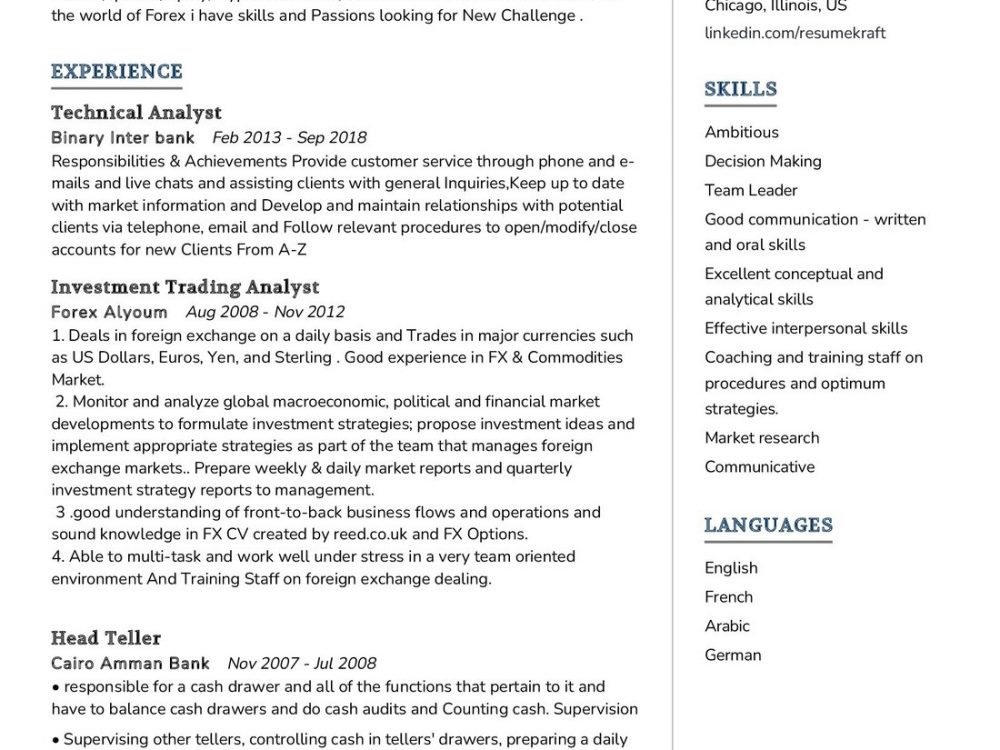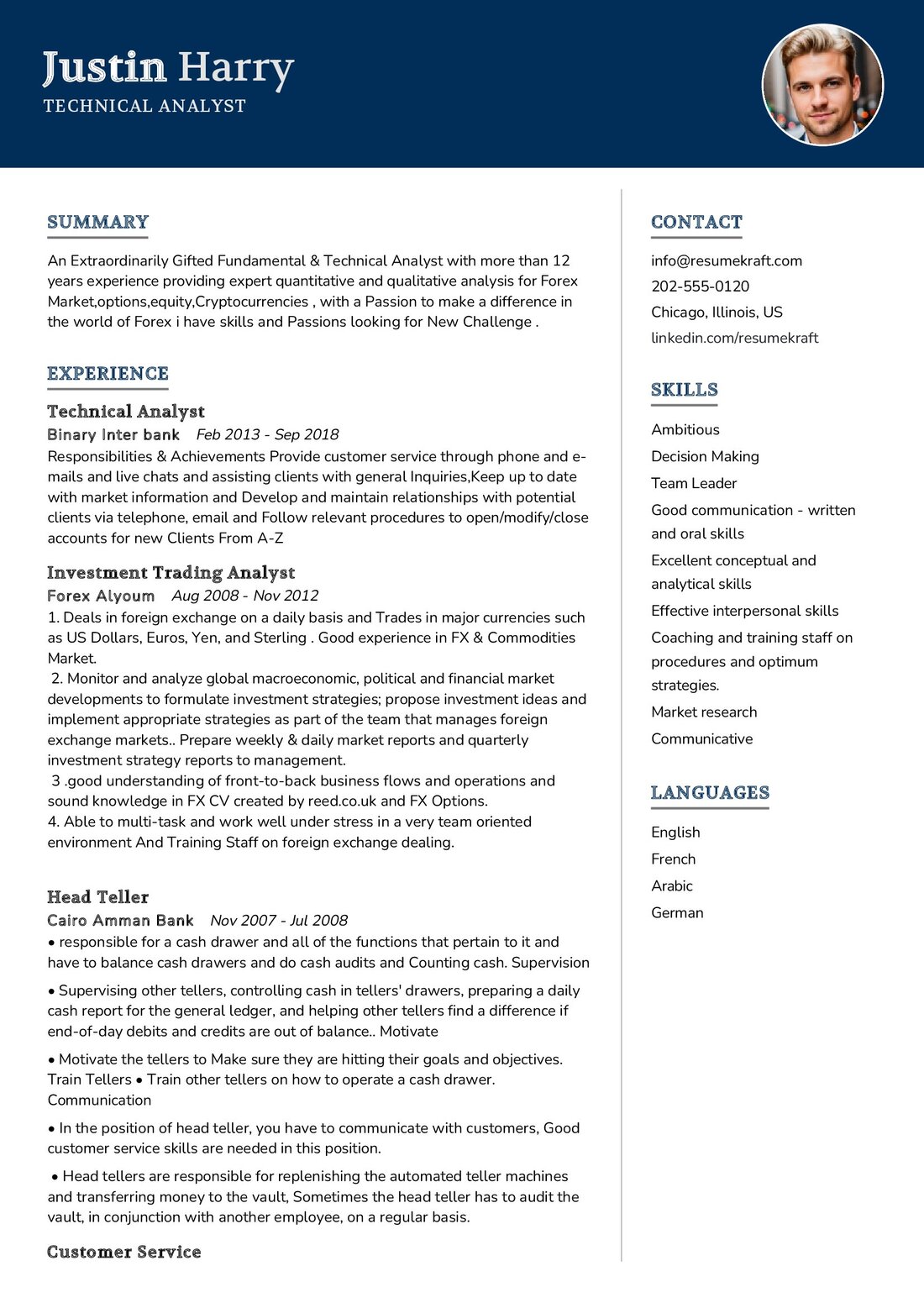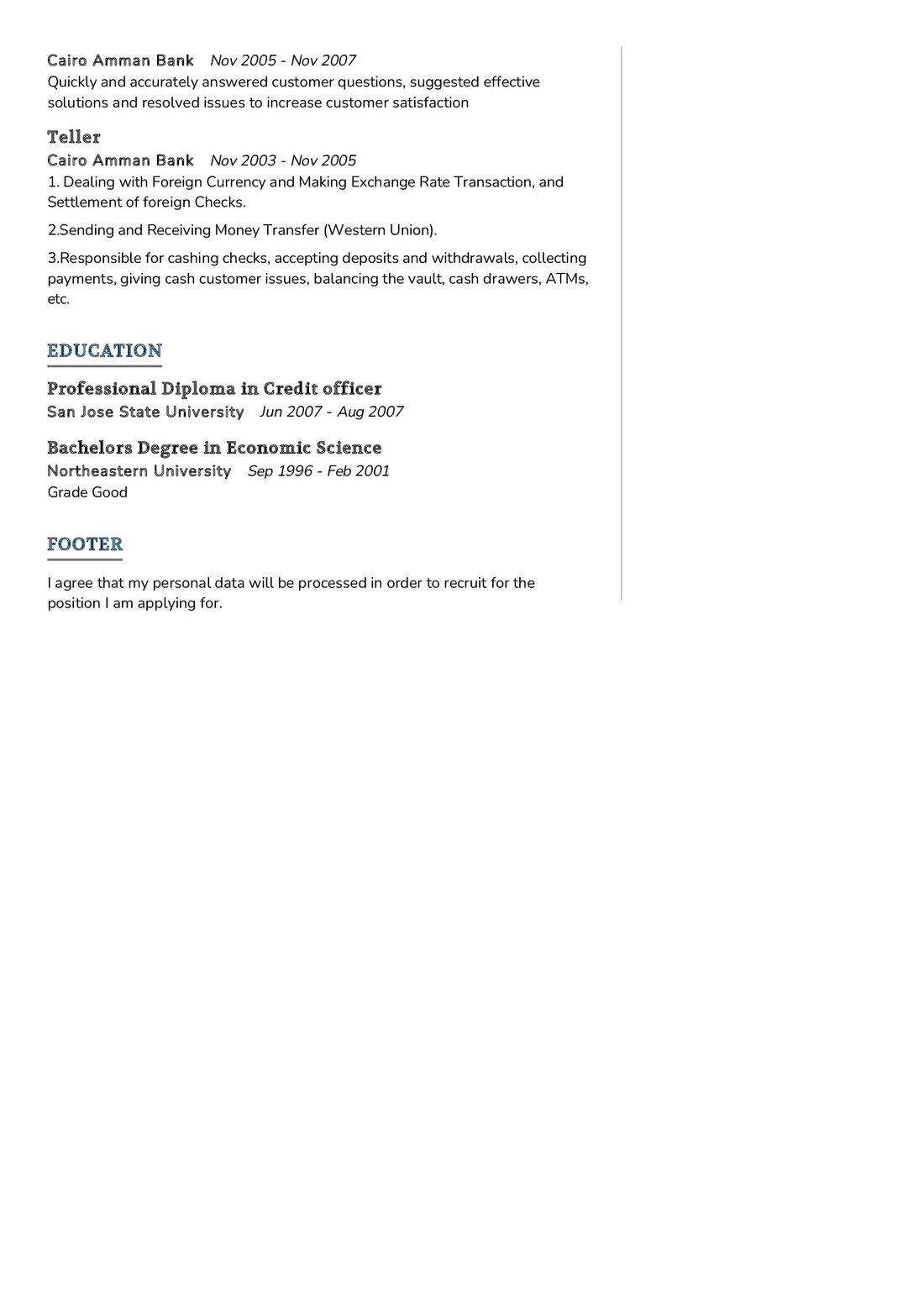Exploring the Role of a Technical Analyst
In today’s fast-paced and technology-driven world, the role of a Technical Analyst has become increasingly crucial across various industries. A Technical Analyst plays a pivotal role in bridging the gap between technology and business, ensuring that IT systems and solutions align with organizational objectives. In this comprehensive guide, we’ll delve deeper into the multifaceted role of a Technical Analyst, exploring their job requirements, responsibilities, and tips for crafting an effective resume for this position.
Job Requirements for a Technical Analyst
Stepping into the role of a Technical Analyst requires a unique set of skills and qualifications. Let’s take a closer look at the prerequisites one needs to fulfill in order to excel in this role:
- A Bachelor’s or Master’s degree in Computer Science, Information Technology, or a related field, providing a strong foundation in the technical domain.
- Proficiency in programming languages such as Python, Java, or C++, essential for analyzing and developing technical solutions.
- An understanding of database management systems, including SQL and NoSQL databases, to effectively handle data analysis and storage.
- Strong analytical and problem-solving skills, honed through coursework and real-world experiences.
- Excellent communication skills, both written and verbal, to facilitate effective collaboration with cross-functional teams.
- Adaptability and the ability to work under pressure, crucial traits for navigating the dynamic IT landscape.
Additionally, obtaining relevant certifications in areas such as data analysis, project management, or specific technologies can further enhance your profile in the competitive job market.
Responsibilities of a Technical Analyst
The role of a Technical Analyst encompasses a wide range of responsibilities that revolve around leveraging technology to drive business success. Let’s explore the core duties that define this role:
- Evaluating and analyzing existing IT systems and infrastructure to identify areas for improvement and optimization.
- Collaborating with business stakeholders to understand their requirements and translating them into technical solutions.
- Conducting in-depth data analysis to extract meaningful insights and support data-driven decision-making processes.
- Designing and implementing technical solutions, which may include software applications, databases, or system integrations.
- Monitoring and maintaining the performance, security, and scalability of IT systems to ensure uninterrupted operations.
- Providing technical support and troubleshooting assistance to resolve issues promptly and minimize downtime.
- Staying up-to-date with emerging technologies and trends to recommend innovative solutions that enhance efficiency and competitiveness.
Each of these responsibilities contributes to the overarching goal of a Technical Analyst, which is to align technology with business objectives and drive growth.
Effective Resume Writing Tips for a Technical Analyst
Your resume serves as your professional introduction to potential employers. Crafting an effective resume as a Technical Analyst requires careful attention to detail and a focus on showcasing your qualifications and experiences. Here are some tips to help you create a compelling resume:
- Highlight your technical skills and expertise, emphasizing programming languages, software applications, and data analysis tools you are proficient in.
- Provide specific examples of projects or initiatives you have led or contributed to, showcasing their impact on improving IT systems or driving business outcomes.
- Quantify your achievements with metrics whenever possible. For instance, mention how your data analysis efforts led to a 15% increase in operational efficiency.
- Customize your resume for each job application, tailoring it to align with the specific requirements and responsibilities of the role you’re applying for.
Your resume is your ticket to securing interviews and ultimately landing the Technical Analyst role you desire, so make sure it effectively communicates your skills and accomplishments.
Sample Resume Summary Examples for a Technical Analyst
Your resume summary serves as the opening statement of your application, providing a concise overview of your qualifications and what you bring to the table. Here are some sample resume summary examples to inspire you:
- “Technical Analyst with a strong background in data analysis and programming. Experienced in implementing technical solutions that drive efficiency and enhance decision-making processes.”
- “Detail-oriented Technical Analyst with a track record of optimizing IT systems and providing technical support. Skilled in translating business needs into innovative technical solutions.”
- “Results-driven Technical Analyst with expertise in database management and software development. Adept at analyzing complex data sets to inform strategic decision-making.”
Your resume summary should be concise yet impactful, giving employers a glimpse of your capabilities and experiences.
**
Education Section for Your Technical Analyst Resume
**
Your educational background plays a crucial role in establishing your qualifications as a Technical Analyst. Here’s how you can structure the education section of your resume:
- Master of Science in Computer Science, XYZ University, 2020. This program provided advanced coursework in data analysis and software development.
- Bachelor of Science in Information Technology, ABC University, 2017. This degree laid the foundation for my technical expertise and problem-solving skills.
- Certified Data Analyst, Data Analytics Institute, 2019. This certification demonstrates my proficiency in data analysis techniques.
Your educational achievements serve as evidence of your commitment to learning and your readiness for the Technical Analyst role.
Key Skills for a Technical Analyst Resume
As a Technical Analyst, your skill set is your toolkit for success. Here are the key skills that should be highlighted on your resume:
Soft Skills:
- Analytical thinking: The ability to dissect complex problems and develop effective solutions.
- Communication: Clear and effective communication with both technical and non-technical stakeholders.
- Problem-solving: Swift identification and resolution of technical issues and challenges.
- Attention to detail: A meticulous approach to data analysis and solution implementation.
- Adaptability: The capacity to embrace change and thrive in dynamic environments.
Hard Skills:
- Data analysis: Proficiency in data mining, visualization, and interpretation.
- Programming languages: Mastery of relevant programming languages like Python, Java, or C++.
- Database management: Competency in SQL and NoSQL databases for efficient data handling.
- Technical support: The ability to troubleshoot and resolve IT system issues.
- System design: Experience in designing and implementing technical solutions.
These skills collectively empower you to excel in your role as a Technical Analyst.
**
Common Mistakes to Avoid When Writing a Technical Analyst Resume
**
While crafting your resume, steer clear of common pitfalls that can hinder your chances of landing your dream job. Here are some mistakes to avoid:
- Using a generic resume for all applications. Tailor your resume to each job posting to emphasize the specific qualifications and skills sought by the employer.
- Focusing solely on job duties. Instead, highlight your achievements and the impact you’ve had in previous roles.
- Ignoring the importance of a cover letter. A well-crafted cover letter can provide additional context and enthusiasm for the position.
- Overloading your resume with technical jargon. Ensure that your resume is accessible to both technical and non-technical readers.
- Neglecting proofreading. Typos and errors can detract from your professionalism. Always proofread your resume carefully.
Avoiding these common mistakes will help you create a resume that stands out and presents you as a strong candidate.
Conclusion
In conclusion, the role of a Technical Analyst is dynamic and critical in today’s technology-driven landscape. Technical Analysts bridge the gap between technology and business, ensuring that organizations harness the power of IT systems to achieve their goals. To succeed in this role, you must possess a unique blend of technical expertise, analytical skills, and effective communication.
If you aspire to become a Technical Analyst or are looking to advance your career in this field, remember that your resume is your first step toward achieving your goals. Craft a resume that not only showcases your technical prowess but also highlights your ability to drive positive change and deliver tangible results.
Don’t forget that resources like AI Resume Builder, Resume Design, Resume Samples, Resume Examples, Resume Skills, Resume Help, Resume Synonyms, and Job Responsibilities are available to assist you in creating an outstanding application and preparing for your Technical Analyst job interview. Utilize these resources to enhance your chances of success in this rewarding field.



